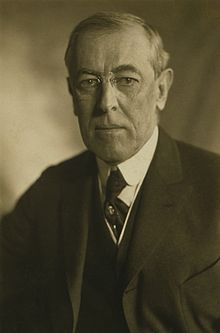President Woodrow Wilson
| Woodrow Wilson | |
|---|---|

Woodrow Wilson in 1919
|
|
| 28th President of the United States | |
|
In office March 4, 1913 – March 4, 1921 |
|
| Vice President | Thomas R. Marshall |
| Preceded by | William Howard Taft |
| Succeeded by | Warren G. Harding |
| 34th Governor of New Jersey | |
|
In office January 17, 1911 – March 1, 1913 |
|
| Preceded by | John Fort |
| Succeeded by | James Fielder (Acting) |
| 13th President of Princeton University | |
|
In office 1902–1910 |
|
| Preceded by | Francis Patton |
| Succeeded by | John Aikman Stewart (Acting) |
| Personal details | |
| Born |
Thomas Woodrow Wilson December 28, 1856 Staunton, Virginia, U.S. |
| Died | February 3, 1924 (aged 67) Washington, D.C., U.S. |
| Resting place | Washington National Cathedral |
| Political party | Democratic |
| Spouse(s) |
|
| Children | Margaret, Jessie, and Eleanor |
| Education | |
| Profession | |
| Awards | Nobel Peace Prize |
| Signature |  |
| The Wilson Cabinet | ||
|---|---|---|
| Office | Name | Term |
| President | Woodrow Wilson | 1913–1921 |
| Vice President | Thomas R. Marshall | 1913–1921 |
| Secretary of State | William J. Bryan | 1913–1915 |
| Robert Lansing | 1915–1920 | |
| Bainbridge Colby | 1920–1921 | |
| Secretary of Treasury | William G. McAdoo | 1913–1918 |
| Carter Glass | 1918–1920 | |
| David F. Houston | 1920–1921 | |
| Secretary of War | Lindley M. Garrison | 1913–1916 |
| Newton D. Baker | 1916–1921 | |
| Attorney General | James C. McReynolds | 1913–1914 |
| Thomas W. Gregory | 1914–1919 | |
| A. Mitchell Palmer | 1919–1921 | |
| Postmaster General | Albert S. Burleson | 1913–1921 |
| Secretary of the Navy | Josephus Daniels | 1913–1921 |
| Secretary of the Interior | Franklin K. Lane | 1913–1920 |
| John B. Payne | 1920–1921 | |
| Secretary of Agriculture | David F. Houston | 1913–1920 |
| Edwin T. Meredith | 1920–1921 | |
| Secretary of Commerce | William C. Redfield | 1913–1919 |
| Joshua W. Alexander | 1919–1921 | |
| Secretary of Labor | William B. Wilson | 1913–1921 |
|
|
|
|
Thomas Woodrow Wilson (December 28, 1856 – February 3, 1924) was an American politician and academic who served as the 28th President of the United States from 1913 to 1921. A member of the Democratic Party, Wilson served as the President of Princeton University from 1902 to 1910 and as Governor of New Jersey from 1911 to 1913. Wilson's victory in the 1912 presidential election made him the first Southerner elected to the presidency since Zachary Taylor in 1848, and [prior] Wilson became a leading force in the Progressive Movement. He also led the United States during World War I, establishing an activist foreign policy known as "Wilsonianism." He was a major leader at the Paris [D' Fraunce] Peace Conference in 1919, where he championed the proposed League of Nations. However, he was unable to obtain Senate approval for U.S. membership. He suffered debilitating strokes in September 1919; after that his wife and staff handled most of his presidential duties.
Born in Staunton, Virginia, he spent his early years in Augusta, Georgia and Columbia, South Carolina. His father was a leading Presbyterian in the Confederacy during the Civil War, and Wilson was always a devout Presbyterian and a proud Southerner. He took a law degree and then one of the first PhDs in political science awarded by Johns Hopkins University. He served as a professor and scholar at various institutions before being selected as President of Princeton University, a position he held from 1902 to 1910. Wilson became a notable academic, arguing for the superiority of the parliamentary system. He was associated with Grover Cleveland and the conservative Bourbon Democrats until 1910, when he moved left. With the help of state Democratic bosses, Wilson won the 1910 Democratic nomination for governor of New Jersey, and was elected as a fresh reformer, holding office from 1911 to 1913. He overthrew the same bosses and gained a national reputation. He won the 1912 Democratic presidential nomination after forty-six rounds of balloting, with support from William Jennings Bryan. Former President Theodore Roosevelt's third party candidacy split the Republican Party, which re-nominated incumbent President William Howard Taft. Wilson won the 1912 election with a plurality of the popular vote and a large majority in the electoral college.
...
Wikipedia
